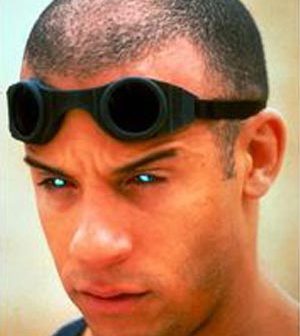A paper about the changing vision of race and color in America: presenting Vin Diesel and his « raceless » persona within the racial history of American action heroes.
In the 20th century, a person like Vin Diesel would never have become one of the highest paid and most famous Hollywood actors, not as a Black man because he was too light, not as a White man because he wasn’t White, and not as a mulatto, however tragic, since they were not played by biracial actors but by white men and women. The presence of Vin Diesel as a major star is an indication that America’s concept of race and skin color has changed. Having a « drop of black blood » doesn’t so much mean that you are Black anymore, but rather that you are cool. Vin Diesel has managed to embrace his multiracial and multicultural audience without antagonizing anyone. Yet from film to film, rather than truly living up to their multiracial identity, Vin Diesel’s characters have become raceless, of no specific color: living proofs of America’s post-civil rights movement, soon-to-be post affirmative-action, fantasized ideal of color-blindness.
In 1987, Robert Townsend wrote, produced and directed Hollywood Shuffle, a film about the life of a young Black actor who could not get any decent roles in Hollywood because Black men were typecast as inner city low-lives who got killed within ten minutes of their appearance on screen. Seven years later, in 1994, the equally unemployed young actor Vin Diesel produced his own short film about his lack of job opportunities not as a Black man, but as a man of unclear ethnic background. In Multifacial, Vin Diesel is a talented actor who cannot land a role because though he can act Italian he doesn’t look the part, though he can act Latino he can’t speak Spanish, and though he can rap and has the voice of Barry White, he is just too light to play Black men, as producers candidly tell him time after time. As Mutifacial shows, people love categories. In 1994, Vin Diesel was determined to create his persona outside of any category.
The company Vin Diesel created to produce Multifacial and then Strays, two films in which he plays the main character, is called « One Race », stating the actor’s refusal to split up the human race into various sub-categories. Strays was shown at Sundance but never released in the theatres. It is a film about a macho kid named Rick who finds true love and doesn’t quite know what to do with it. Apparently he is not racially categorized in the film. Multifacial however is about race, more precisely how it will affect an actor’s career or lack thereof. The character’s name is simply Mike, revealing nothing of his ethnic background. Whenever Mike names the actors he admires, he pairs an Italian American and an African American, Al Pacino and Denzel Washington the first time, Marlon Brando and Morgan Freeman the second time. At the very end of the film, Mike gives a moving monologue he wrote about having an African American father who aspired for his son not to be a Black actor but just an actor. When the casting agent showers him with compliments he knows won’t get him the job, he tells her « it was just a story ». During the film, Mike’s parents are said not to be Spanish. Apparently they are Italian. In real life, Vin Diesel had a Black father he never met and was brought up by his stepfather, also an African American by the name of Irving Vincent, whose last name Vin Diesel also bears. He grew up in Greenwich Village, a multicultural and multiracial place if there ever was one. He also tells stories about how as a child he always felt ostracized and can therefore identify with the rejected anti-hero characters he has played such as « the Iron Giant » in the excellent animated movie of the same name, or Richard Riddick in Pitch Black.
Yet, true to his « One Race » credo, Vin Diesel never again played a character that embraced his Black biological heritage the way Multifacial did. Rather, in all of his subsequent films, Vin Diesel’s race is not discussed as such. He interacts with men and women of all races, while his own race is in no instance mentioned or made an element of the plot per se. Vin Diesel played Pvt. Adrian Caparzo, an Italian American soldier, in Saving Private Ryan (1998); he gives his voice to the metal alien in The Iron Giant (1999); he is Chris Varick, an Italian American broker, in Boiler Room (2000); and most famously Richard B. Riddick, a man of undetermined race, in Pitch Black (2000). He then played Dominic Toretto, an American of Cuban descent, in The Fast and the Furious (2001), immediately followed by the Jewish tough guy Taylor Reese in Knockaround Guys (2001). He then became immensely famous as Xander Cage, the hero of XXX (2002), again a character of undetermined race like in his following movie, the aptly named A Man Apart (2003), in which he plays Sean Vetter. In Boiler Room in particular, Vin Diesel’s character must put up with particularly racist co-workers which is either a testimony to his extreme cool when faced with irrelevant attacks, or more likely, his character’s lack of identification with Blacks – he is said more than once to be Italian. Vin Diesel’s race has been the subject of many film reviews (not to say every) and always comes up in his televised interviews, though systematically qualified by disclaimers to the irrelevance of the matter. People ask about his hair, his biological father, how he defines himself, is he Black or is he not? Vin Diesel answers that his hair is thinning, that he is multicultural, and that he embraces his racial ambiguity.
Vin Diesel’s most interesting character from a racial point of view is Richard B. Riddick from Pitch Black. Pitch Black is a science fiction film centered on issues of race, class, gender, and sexuality. All in one film. A small group of survivors are stranded on an inhospitable planet lit by three suns. Predatory creatures are living underground. The crew crashes hours before a total eclipse, a time when the light sensitive creatures can come out and hunt. All the characters are types, as is usual in such films, but they are actually defined by their ambiguous nature. One British antique dealer (Paris P. Ogilvie) is most clearly yet never outspokenly gay. The female captain, Carolyn Fry (Radha Mitchell), sets off with the guilt of having almost sacrificed the whole crew to save herself, unknown to all the survivors but one. While everyone is thankful for their captain saving their lives, she keeps answering « I am not your captain ». Introduced as a « blue-eyed devil » by Riddick’s voice-over, William J. Johns (Cole Hauser) knows Fry’s secret but also has secrets of his own. He is a morphine addict, and a bounty hunter rather than an officer of the law. Finally, Jack (Rhiana Griffith), the youngest survivor, is revealed to be a girl and not a boy, like she is letting everyone believe.
The character I am most interested in is of course Vin Diesel’s Richard Riddick. His racial ambiguity is a metaphor for his moral complexity. He admits to having killed men. He was in prison long enough to have his eyes surgically altered so he could see in the dark, knowing he would probably never see daylight again. Under the circumstances, this soon becomes a valuable asset and though he is a dangerous criminal, he also is the only one who is capable of saving the rest of the surviving crew. They must trust who they most fear. No reference is ever made to his racial background, except that 1. in the first minutes of the film he refers to Johns as the « blue-eyed devil », a phrase used by Malcolm X to speak of the white man; 2. he tells Carolyn Fry, the female pilot, « so, you finally found someone scarier than me » and 3. tells her later, as she understands about the coming eclipse « You’re not afraid of the dark now, are you? » These elements can be read as hinting to his race. He is mostly considered as « other ». When Carolyn must convince Riddick not to take off but back for the others she says « there’s got to be some part of you that wants to rejoin the human race ». He is a human being, but he has certain sensory powers that others lack. He can smell the morphine on Johns, the blood the boy is not supposed to be shedding, and just like the alien creatures, his vision is opposite everyone else’s. Possibly because he feels a commonality, he is the only one who finds the deadly night creatures « beautiful » instead of simply horrifying. In the very first scene, Riddick is the one commenting the ship’s crash in voice-over. His face is largely hidden by a wide blindfold. His skin color is difficult to make out due to color filters used to convey general malfunction of the aircraft. Only his voice, deep and hoarse, is a distinctive clue to his race. In contrast, Abu’Imam’ al-Walid (Keith David), referred to as the « holy man », is clearly of African descent.
Jack/Jackie, the boy-girl, greatly admires Riddick for his ambiguity as a good-bad guy. She shaves her head and wears small dark glasses to look as much as possible like Riddick, and she is white. In the scene where Jack, fascinated by Riddick’s eyes, watches Carolyn Fry question him about the loss of the first victim to the alien creatures, Riddick tells Fry whom he’s just terrorized with his light-beaming eyes to « look deeper » into the ground where Zeke was torn to pieces, possibly meaning « deeper than skin deep », deeper than appearances, serving as a civic lesson of sorts to the impressionable teenager.
With Pitch Black, Vin Diesel was truly given the opportunity to represent the multicultural, raceless action hero that all audiences can relate to. Vin Diesel’s characters never use the word « Black » or « African American » to refer to themselves or any family member after Multifacial. For Pitch Black, A Man Apart and XXX, the three films where Vin Diesel’s ethnicity is never referred to in the dialogue, the actor has described his characters as « urban heroes » while he uses terms such as « Italian », « Cuban American » or « Jewish » for other characters. (Krulik, 28)
It appears, however, that more and more Vin Diesel’s undecipherable ethnic background – he has been said to be a combination of German, Italian, Irish, Dominican, Mexican, and yes, African-American – is a key element of his career as an actor. His race is the subject of Multifacial, it is the strength of Pitch Black, and it is the never spoken mystery of XXX and A Man Apart. The triple X stands for the character’s first initial and nickname, Xander Cage a.k.a. X, repeated in his tattoo at the back of his neck: three Xs. It evidently also has a teaser effect, as a non-fulfilled promise of scenes that were deleted to ensure a PG-13 rating. It can be read as the indicator of a new generation of secret agents, taken one notch further, from a double O-7 to a triple X. And finally, a personal interpretation is that it stands for the non mark, the anonymous race of a man whose skin color and facial features is not unlike another famous man named X: Malcolm, who living under different times, with a different upbringing and family situation, was indeed of a different race.
Immediately following the immense success of XXX came A Man Apart, in which Vin Diesel plays Sean Vetter, a man with the talk, the walk, the clothes and the childhood friends of a Black man, yet never said to be Black because like Vin Diesel himself, he is « a man apart ». Surrounded by all kinds of people, he personifies the racial line, bringing the different races together rather than dividing them. Picking up on his « urban hero » character from Pitch Black, in the Chronicles Riddick finds out about his past. In a universe made of many different races, Riddick is a Furian. He was separated from his people at birth because of a prophesy that an unborn Furian would one day overthrow the Necromongers’ Lord Marshall and become the new leader. The Furians are a race of fierce soldiers who are neither motivated by money nor power, but by their innate hatred of authority: they are free-spirited rebels gifted with impressive physical skills. Having suffered quite a bit of injustice in his youth, Riddick has turned into a bitter cynic whose calculating sense of right and wrong is however intact. Most importantly, he is not a human being, he is indeed literally « other », as clearly established yet never made explicit in Pitch Black, a film in which on the contrary he is assumed to be part of the human race.
As far as women are concerned, Vin Diesel has not dated much on screen. His first on-screen romantic counterpart was Michelle Rodriguez in The Fast and the Furious, in which he played a Cuban-American character Dominic Toretto. She was said to be his off-screen girlfriend at the time. He falls in love with a white Russian agent in XXX, and is married to a white woman in A Man Apart. In The Chronicles of Riddick, Riddick is protective of Kyra, a white woman, the grown-up version of the boy/girl from Pitch Black. There is some sexual tension though their relationship remains fraternal rather than sexual. Vin Diesel will in all probability be dating many more beautiful women of all races on screen in the future. For the time being, if the race of the women a character dates is any indication of his racial persona, given present-day America’s rate of interracial dating, it seems that the XXX race, the race by default, is dangerously getting closer to simply being white
America might have been built on the myth of a classless society, but it was never built on the myth of a raceless society. Yet, in the past two decades, with the demise of affirmative action as a defunct polity based on an archaic vision of racial relations, the myth of a colorless society is gaining ground. Though most non-Whites still experience a highly color-coded world, and most Whites still interact overwhelmingly with White people, Hollywood, ever the promoter of social change, seems to be resorting in this very case to a racially ambiguous actor to sell the myth of a raceless America to the greatest number of racially conscious Americans. A case in point is the soaring career of non-hyphenated American actor Vin Diesel, whose star persona is entirely built on the blurring of racial lines. It is fitting that his first major role was in Pitch Black, meaning dark at its blackest, and that his last roles to date have been for XXX and A Man Apart, with metaphors for his colorlessness in the titles. The Chronicles of Riddick, which in all fairness, should have been entitled Pitch Black 2, also deletes any reference to color. Vin Diesel has the skin of a White man, the facial features of a Black man, an Italian American sounding first name, Vincent (his last name by birth), a Black voice and a very Black sense of cool. He is the perfect multiracial and multicultural hero. He can be read as the latest specimen of a long line of actors cultivating racially ambiguous personas, whether their skin was Black or White, from Sidney Poitier and Elvis Presley to Will Smith and Bruce Willis. Vin Diesel is the first major movie star to also have a racially ambiguous physique.
Despite and because of Vin Diesel’s claim that his race is irrelevant, his persona is unquestionably over-determined by issues of race. In the most Hollywood of fashions, just as Vin Diesel’s subsequent roles negated and ignored every class and gender subtlety raised by Multifacial and complicated in Pitch Black, so did they erase the racially charged tensions his presence fostered in those film, relegating entirely to the extra-filmic all discussions about his refusal to be categorized. Vin Diesel’s new action hero is raceless, neither Black nor White he is of no race, the hero of a new America, free of prejudice and privilege. Most Americans over twelve will recognize the prank, yet delight in it. And Hollywood can be the colorful dream factory of the wannabe colorblind.
///Article N° : 3781










Un commentaire
Euphamisms for a Black Man who simply doesn’t want to be identified as a Black man. He’s not so colorless… his love interests in his movies are almost always clearly more White than Black. Where’s the ambiguity that this article professes? Vin Diesel clearly knows that the large$t part of the bread is not the cru$t.